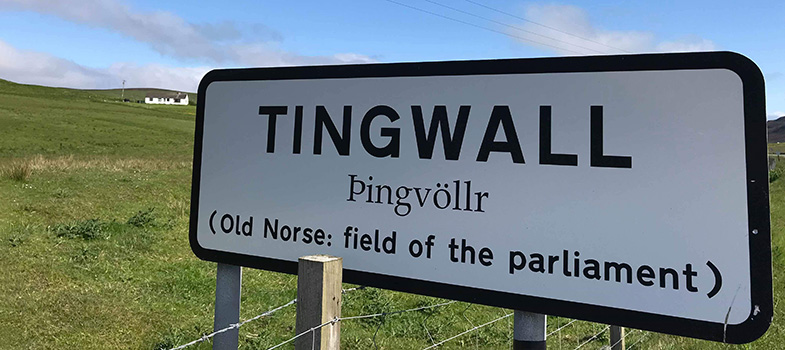1.2 Lugs: where Scots can be heard
The Scots language can be heard in almost every community in Scotland. For many it is an integral part of Scottish life and is heard on a daily basis in the workplace, at sports and communal events, in shops and in the family.
However, in spite of the 2011 Census recording a total of 1,541,693 Scots speakers, it is often said that nobody really speaks the Scots language. Bearing in mind what you know or will be learning about Scots vocabulary and expressions, put this to the test by opening your ‘lugs’ and listening to how Scottish people actually speak. Although 'The Banter Boys' [Tip: hold Ctrl and click a link to open it in a new tab. (Hide tip)] from the comedy sketch show 'Chewin the Fat' (which is discussed later) may well spring to mind, you will be able to assess for yourself the veracity of this commonly held belief that there are no speakers of Scots.
Where there are Scots, you are likely to hear Scots being spoken, either by Scots on holiday and by Scots émigrés in England, Canada, Australia, New Zealand, the United States and other countries. There are also approximately 16,000 speakers of Ulster Scots - the Scots language as spoken in parts of Ulster in Northern Ireland.
The Scots language continues to be a central force in Scottish Theatre. Liz Lochhead's 'Mary Queen of Scots Got Her Head Chopped Off', John Byrne's 'The Slab Boys', Gregory Burke's 'Blackwatch' and Ishbel MacFarlane's one-woman show 'O is for Hoolet' are but a sample of the many plays which channel the dramatic spoken power of the Scots language to audiences across the country and around the world.
Scots is heard on Scottish radio and television, although perhaps not as often as it might be. What is clear is that the number of programmes made in or about Scots currently do not reflect in terms of percentage the number of Scots speakers reported by the 2011 Census. When Scots does feature in Scottish broadcasting, it is generally heard in one of two kinds of programmes: radio phone-ins and comedy shows.
Many callers to phone-in discussion programmes are Scots speakers, although presenters usually speak only in English. One noteworthy exception is BBC Radio Scotland's popular football phone-in programme Off the Ball whose presenters Tam Cowan and Stuart Cosgrove habitually speak in Scots. Other examples of such phone-in shows can be found on BBC Scotland and STV websites and iPlayer.
Since the early years of television, broadcasters have packaged the Scots language almost exclusively as comedy. Watching a selection of video clips of, for example, Stanley Baxter's Parliamo Glasgow, Scotland the What?, Scotch and Wry and Rab C. Nesbitt will give a sense of this tradition. More recent Scottish comedy programmes - Chewin the Fat, Still Game, Limmy's Show and Burnistoun - often offer a nuanced self-referential approach to the Scots language as demonstrated by the Burnistoun character 'Real Guy' played by Robert Florence.
The Scottish broadcaster Billy Kay has over a thirty-year period consistently presented radio programmes on a wide range of issues in his own Ayrshire Scots. He notably hosted Scotland's only ever dedicated television show in Scots called 'Kay's Originals'.
The Scots language has been the subject of a small number of educational programmes including Haud Yer Tongue (Channel 4, 1999) and Scots Scuil (BBC Scotland, 2012).
Scots can be heard regularly on the long-running BBC drama River City. Many of the programme's characters are Scots speakers and use the Scots language to express the full range of the human condition.
In addition to River City, the only other current regular broadcast in Scots is the internet radio programme Scots Radio. Frieda Morrison has been hosting this unique radio show since 2013, presenting in Doric and interviewing Scots-speaking guests covering an encyclopaedic list of topics.
Writer and commentator Gerry Hassan has described a "chasm in how culture in Scotland is represented and reflected back to us in the media and in particular, broadcasters. I am thinking of culture in the widest sense...encompassing...our histories, traditions, voices and languages. The diverse, fascinating and challenging world of Scotland culturally just doesn’t gain adequate coverage, representation or time on BBC Scotland or STV.This means that many of us are alienated from the modern Scotland we live in beyond our experiences." (Gerry Hassan, Scottish Review, 2013)
Activity 5
In order to explore the representation of Scots language in the current Scottish everyday life further, research any one day of Scottish radio and television listings. For example, you could review the listings of some of the Scottish radio stations catalogued here.
- Note how many programmes on the day of your choice are spoken in Scots or are about Scots.
- Then write a summary of 50 to 100 words comparing the percentage of the 37% of Scots speakers reported by the 2011 Census to the number of radio and television programmes made in the Scots language.
Answer
This is our model answer. Your answer might be different.
People in Scotland do not hear much Scots spoken on their radios or televisions. While old television programmes which do use Scots are sometimes repeated around the New Year period, these are usually comedies. Most days there is no broadcasting in Scots at all.
It could be said that this contrasts strongly with the 2011 Census which recorded over one and a half million Scots speakers or one-third of the population of Scotland, many of whom are television viewers and/or part of the radio audience.
1.1 Mooth: where Scots is spoken
